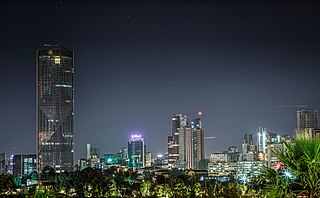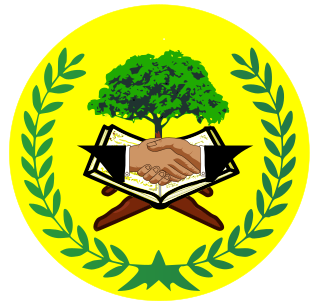
The politics of Ethiopia are the activities associated with the governance of Ethiopia. The government is structured as a federal parliamentary republic with both a President and Prime Minister. The legislature is multicameral, with a house of representatives and a council. The term politics of Ethiopia mainly relates to the political activities in Ethiopia after the late 20th century when democratization took place in the nation. The current political structure of Ethiopia was formed after the Tigrayan People's Liberation Front (TPLF) overthrew dictator President Mengistu Haile Mariam in 1991. A general election was held in June 1994 and Ethiopia has maintained a multiparty political environment until today.

Addis Ababa is the capital and largest city of Ethiopia and Oromia In the 2007 census, the city's population was estimated to be 2,739,551 inhabitants. Addis Ababa is a highly developed and important cultural, artistic, financial and administrative center of Ethiopia. It is widely known as one of Africa's major capitals.
A member of parliament (MP) is the representative in parliament of the people who live in their electoral district. Members of parliament typically form parliamentary groups, sometimes called caucuses, with members of the same political party. Many countries with bicameral parliaments, this term refers only to members of the lower house since upper house members often have a different title. The terms congressman and deputy are equivalent terms used in other jurisdictions.

Ethiopia, officially the Federal Democratic Republic of Ethiopia, is a landlocked country located in the Horn of Africa region of East Africa. It shares borders with Eritrea to the north, Djibouti to the northeast, Somalia to the east, Kenya to the south, South Sudan to the west, and Sudan to the northwest. Ethiopia covers a land area of 1,104,300 square kilometres (426,400 sq mi). As of 2024, it is home to around 132 million inhabitants, making it the 10th-most populous country in the world, the 2nd-most populous in Africa after Nigeria, and the most populated landlocked country on Earth. The national capital and largest city, Addis Ababa, lies several kilometres west of the East African Rift that splits the country into the African and Somali tectonic plates.
The 100 seats in the United States Senate are divided into three classes for the purpose of determining which seats will be up for election in any two-year cycle, with only one class being up for election at a time. With senators being elected to fixed terms of six years, the classes allow about a third of the seats to be up for election in any presidential or midterm election year instead of having all 100 be up for election at the same time every six years. The seats are also divided in such a way that any given state's two senators are in different classes so that each seat's term ends in different years. Class 1 and class 2 consist of 33 seats each, while class 3 consists of 34 seats. Elections for class 1 seats took place in 2024, and elections for classes 2 and 3 will take place in 2026 and 2028, respectively.

The president of Ethiopia is the head of state of Ethiopia. The position is largely ceremonial with executive power vested in the Council of Ministers chaired by the prime minister. The current president is Taye Atske Selassie, who took office on 7 October 2024. Presidents are elected by the Federal Parliamentary Assembly for six years.

Ismaïl Omar Guellé is a Djiboutian politician who has served as the President of Djibouti since 1999, making him one of the longest-serving rulers in Africa. He is often referred to by his initials, IOG.

Girma Wolde-Giorgis was an Ethiopian politician who was the president of Ethiopia from 2001 to 2013. He was the second person to hold the office of president since the founding of the Federal Democratic Republic of Ethiopia in 1995.

Midterm elections in the United States are the general elections that are held near the midpoint of a president's four-year term of office, on Election Day on the Tuesday after the first Monday in November. Federal offices that are up for election during the midterms include all 435 seats in the United States House of Representatives, and 33 or 34 of the 100 seats in the United States Senate.

National-level elections in Djibouti are held for the President and the unicameral National Assembly.

The Coalition for Unity and Democracy, commonly referred to by its English abbreviation CUD, or occasionally CDU, was a coalition of four existing political parties of Ethiopia which combined to compete for seats in the Ethiopian General Elections held on May 15, 2005, and around the end of that year, became a full-fledged political party. Its leader was Hailu Shawul and the political party was dissolved in 2007.

The 1834–35 United States House of Representatives elections were held on various dates in various states between July 7, 1834, and November 5, 1835. Each state set its own date for its elections to the House of Representatives before the first session of the 24th United States Congress convened on December 7, 1835. They were held during President Andrew Jackson's second term. Elections were held for 240 seats that represented 24 states, as well as the at-large-district seat for the pending new state of Michigan.

The Federal Parliamentary Assembly is the federal legislature of Ethiopia. It consists of two chambers:

The House of Elders, also known as the Guurti, is the upper house of the Parliament of Somaliland. It has 82 members, representing traditional leaders. The House of Elders is mandated with considering bills proposed by the lower house of the parliament, the Somaliland House of Representatives.

Religion in Ethiopia consists of a number of faiths. Among these mainly Abrahamic religions, the most numerous is Christianity totaling at 67.3%, followed by Islam at 31.3%. There is also a longstanding but small Ethiopian Jewish community. Some adherents of the Baháʼí Faith likewise exist in a number of urban and rural areas. Additionally, there is also a substantial population of the adherents of traditional faiths.

Sahle-Work Zewde is an Ethiopian diplomat who served as president of Ethiopia from 2018 to 2024, the first woman to hold the office. She was elected as president unanimously by members of the Federal Parliamentary Assembly on 25 October 2018.

The presidential election held on 7 October 2013, was the fourth presidential election of the Federal Democratic Republic of Ethiopia to elect the country's third president. Mulatu Teshome was elected by the parliament to a six-year term. Incumbent president Girma Wolde-Giorgis was barred from seeking re-election due to term limits.
The following lists events that happened during 2007 in Ethiopia.

A snap presidential election was held in Ethiopia on 25 October 2018, prompted by the resignation of incumbent Mulatu Teshome. It was the fifth presidential election of the Federal Democratic Republic of Ethiopia to elect its fourth president.

A presidential election was held in Ethiopia on 7 October 2024 to elect its next president.

















